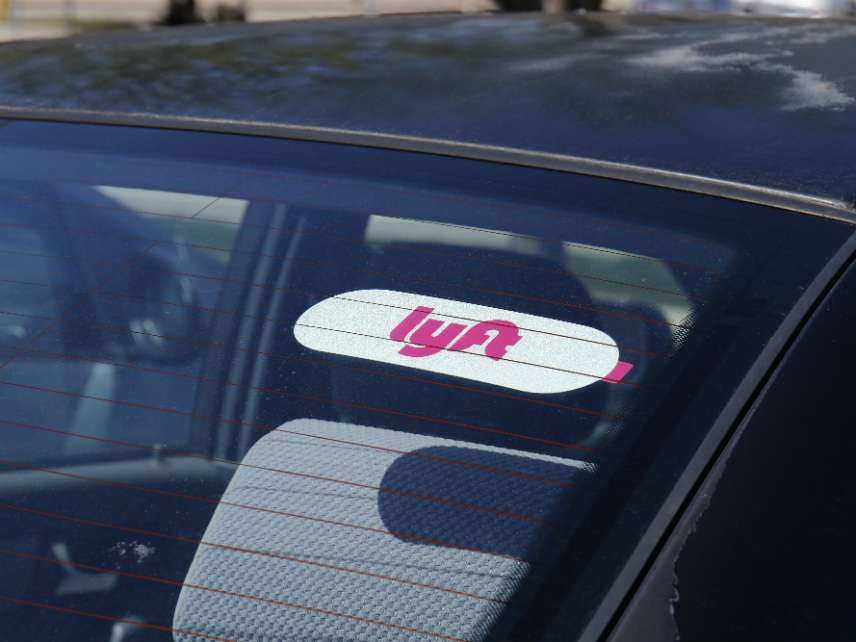Local News Spreads Panic About Under-18's Taking Uber and Lyft Unaccompanied
Ridesharing poses no particular dangers for minors.

Local news has seized on a new terror plaguing the nation: minors riding unaccompanied in Ubers and Lyfts.
Las Vegas ABC affiliate KTNV warned viewers yesterday that this "dangerous practice is rampant across Las Vegas and drivers say no one is trying to stop it." On Monday, Nashville's FOX 17 ran with a hard-hitting investigation of a 15-year-old who went undercover for the station in order to take an Uber to a coffee shop.
In February, D.C.'s FOX5 did a segment featuring a 12-year old who was shuttled from one parent's house to another alone, via Uber. That same month, NBC's Bay Area affiliate warned of a "state loophole" that "leaves minors at risk while riding Uber and Lyft."
The danger all these children are in apparently is that they run the risk of being kidnapped, assaulted, or worse, by whichever random psycho they connect with via ridesharing apps.
Amy Sulam-Gibbs, the mother of the 15-year-old in the FOX 17 story, told the station: "They can't do full psych evals on these drivers. You really are taking a risk. You're getting into a stranger from the internet's car."
The "loophole" that NBC believes is endangering minors is the fact that Uber and Lyft drivers do not need to be fingerprinted the same way daycare providers and school bus drivers are. Other stories blame the ridesharing companies for failing to better enforce their own terms of service, which specifically prohibit those under 18 from using the app.
Yet, for all the fearmongering, crimes committed against minors by ridesharing drivers are mercifully rare.
The KTNV story mentions only two examples of a minor being assaulted by their driver, one in Orange County, California the other in the Miami, Florida area. The NBC story mentions a third incident in which a driver exposed himself to a 16-year-old passenger.
All three incidence are, of course, terrible. However, in the two assault cases, the information collected by ridesharing companies meant the perpetrators were quickly caught.
In the Miami case, police were able to subpoena Lyft for information on the driver after the victim reported the assault. In the Orange County case, the family member who had ordered the Uber ride for the underage victim was able to use the app's tracking feature to find her and her assailant after she did not return home on time.
In the story reported by NBC, Uber proved particularly unhelpful, but that was, ironically enough, a byproduct of the company not allowing minors to use its app.
When the 16-year-old in question tried to report her exhibitionist driver to Uber, her account was deactivated because she was under 18, making it more difficult for her to give identifying information about him to law enforcement. (Uber also declined to give the driver's information to law enforcement without a subpoena, which police were, according to NBC's telling, unable to get because the underlying crime was only a misdemeanor.)
An exhaustive CNN review of assaults by rideshare drivers turned up 103 cases that've occurred in the last four years, and by far, the most likely people to get assaulted by their driver were not children, but adults, usually intoxicated women travelling alone.
There also seems to be little evidence that more extensive background checks—beyond the type that both companies already perform—would reduce the incidences of assault.
A 2016 story from the Associated Press was unable to say one way or another if passengers were more likely to be assaulted by rideshare drivers or traditional cabbies. A Cato Institute study the year before found that Uber and Lyft's requirements for drivers were more strict than those governing taxis and other for-hire vehicles.
It's important to recognize too that while there are risks for minors taking Uber and Lyft—which is against the companies' terms of service—there are also risks to finding a way to prohibit youths from these services.
Rideshare companies can provide a sober ride home for under-18s who are too drunk to drive and too embarrassed to call mom or dad. It could also help children of single parents (or overworked couples) get where they need to go before and after school, or to and from part-time jobs.
Indeed, there's already budding demand for these services, as evidenced by smaller, kid-focused ridesharing services like Zum and Sheprd.
It's natural for parents to be concerned about the dangers of teenagers and younger children getting rides from complete strangers. That said, there is little evidence that this means of transportation is especially dangerous to minors.
